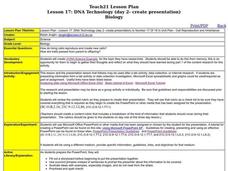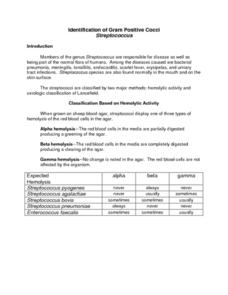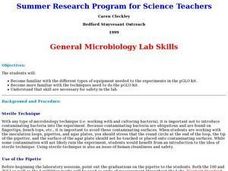Curated OER
Displaying Populations: Jellybeans, Paper and People
Students investigate the factors affecting population growth. In this biology lesson, students collect data from the lab and graph them. They estimate population size using a mathematical formula.
Curated OER
Lesson 14: Genetic Disorders
Learners create PowerPoint presentation on the topic they researched. In this biology lesson, students fill out a storyboard about their topic. They share their project in class.
Curated OER
DNA Technology
Young scholars prepare PowerPoint presentation on DNA and cells. In this biology lesson, students create a storyboard of their presentation. They share the finished project in class.
Curated OER
Pharmaceuticals and Treatments
Students perform an experiment involving reverse transcriptase-polymerized chain reaction HIV replication to better examine the biotechnology used by scientists in pharmaceutical research of infections diseases like HIV. Students examine...
Curated OER
Genetics and DNA
Students describe the structure of DNA and its components and can comprehend that real DNA and its cartoon representation are very different. They are able to link DNA to genetic make-up.
Curated OER
Module #1
Students explore and can explain genetic diseases, and how the central dogma plays a key role in genetic diseases. They comprehend what DNA probe is and how it is created and that there is an ethical component to biotechnology.
Curated OER
Anatomy of the Heart
Tenth graders examine the different parts of the heart. In this biology lesson plan, 10th graders perform dissection of the fetal pig. They explain how the heart maintains homeostasis.
Curated OER
The Good and Bad Bacteria
High schoolers are able to name one kind of harmful bacteria and why it hurts us and also name one kind of helpful bacteria and how we use it. They describe the process of growing bacterial cultures in a lab. Students create a reasonable...
Curated OER
Harvesting Energy from Food: How do Plants Help Humans?
Beginning botanists view slides of plant vascular tissue. They watch Magic School Bus Gets Planted, which you can find online, and then write a summary of what they have learned about plants. This lesson could be used with upper...
Curated OER
Dinosaur and DNA Days
Biology stars extract DNA samples from beef thymus and then examine its properties. They use enzymes to digest the DNA samples, and then use electrophoresis to separate fragments. Finally, they discuss methods and principles of...
Curated OER
Phototaxis
Students conduct lab experiment to answer the question: How will starving Dictyostelium Discoideum Slugs respond to white light? They determine whether the slugs are attracted to or repelled by the light.
Curated OER
DNA Fingerprinting: You Be the Judge!
Learners use their knowledge of DNA fingerprinting to evaluate the use fingerprints in courts, and will address the ethics of establishing a national database of fingerprints.
Curated OER
DNA Detectives
In order to understand DNA fingerprinting, advanced biology aces divise a crime scenario and analyze three different samples of lambda DNA. This creative lesson plan provides practice with micropipettes, electrophoresis boxes, and other...
Curated OER
Pharmaceutical Lesson Plan
Students are able to discuss and prepare a written summary of a scientific article about AIDS. They propose solutions to the opening activity of which drug is more effective in the fight against AIDS.
Curated OER
Jurassic Park: The Science and Ethics of Genetic Engineering
Explore genetic engineering through an engaging "Jurassic Park" unit, which is an extensive use of a cross-curricular teaching event. Planned for AP Biology, English, and Calculus students, learners and teachers are involved for 4-6...
Curated OER
The Scientific Method, Blood Typing, and Antibiotic Resistance
Students are given some components of an experiment, where they are able to identify and fill in missing parts, such as hypothesis, conclusion, results, etc. They form a hypothesis given general scientific facts. Students apply the...
Curated OER
LP 6--8: Xenopus laevis (frog) Development for a 7th Grade Audience
Seventh graders view lab stations with Xenopus at different stages of development. They identify the life stage of the sample, as well as the previous and next stages. Students must explain their reason for selecting the specific stage.
Curated OER
Identification of Positive Streptococci
After being introduced to the genus Straptococcus, biology buffs set up agar plates, esculin slants, and salt broth tubes with different species to test. The level of laboratory skills required to perform this activity makes it most...
Curated OER
Light and Starch Production in Photosynthesis
Students are given the unique opportunity to see the contrast between parts of a leaf that have photosynthesized and parts of the leaf that have not. This visual image helps students see the results of this biological process. At the...
Curated OER
BLAST Algorithm
Young scholars explore a series of activities on using BLAST. In this biology lesson, students explain the significance of BLAST in DNA query. They give real world applications of BLAST.
Curated OER
The Environment and Interactions of Living Organisms
Young scholars study the environment and interactions of living organisms. They identify abiotic and biotic factors and create a foldable and vocabulary cards. They create a poster illustrating soil and watch a video to study symbiosis.
Curated OER
General Microbiology Lab Skills
Students study the different types of equipment necessary for the experiments in the pGLO kit. They examine the techniques and safety procedures for working with the kit.
Curated OER
Vertebrate Skeletons
In this biology worksheet, students examine the human skeleton and then classify animal bones according to their similar function.
Curated OER
Factors Affecting Plant Growth
Students determine the physical and chemical factors that affect plant growth. In this biology lesson, students explain the role of hormones in plants. They investigate how competition with other plants affect their growth.

























